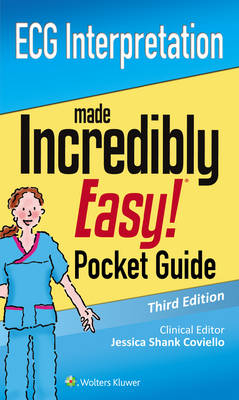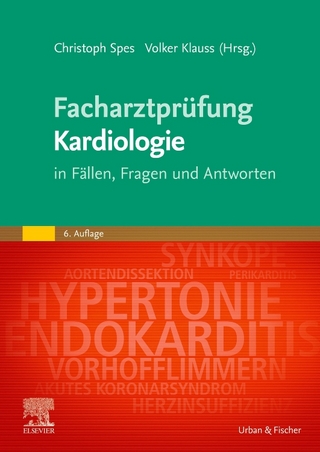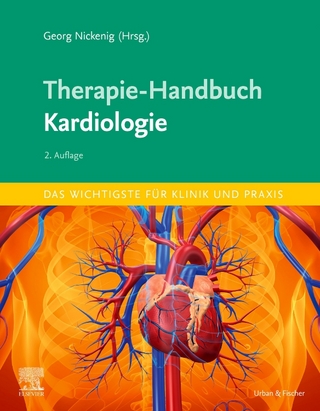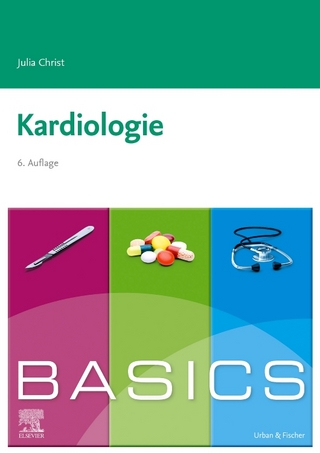
ECG Interpretation: An Incredibly Easy Pocket Guide
Seiten
2016
|
3rd edition
Lippincott Williams and Wilkins (Verlag)
978-1-4963-5216-3 (ISBN)
Lippincott Williams and Wilkins (Verlag)
978-1-4963-5216-3 (ISBN)
New at ECG interpretation? No need to go it alone—keep the basic skills and concepts at your fingertips, with ECG Interpretation: An Incredibly Easy!® Pocket Guide .
Use this enjoyable reference for at-a-glance reviews of how to use and monitor ECG equipment, obtain and interpret rhythm strips, and accurately spot and treat arrhythmias. Full of helpful charts, illustrations, and easy-to-relate-to definitions, this is the perfect on-the-spot guide for students, new nurses, and all those looking for expert guidance on the job.
Increase on-the-job or classroom confidence with this must-have pocket guide, featuring:
NEW and updated content in quick-read, bulleted format, with easy-to-remember guidance on topics including: o Identifying and interpreting atrial, junctional, ventricular, sinus node, and atrioventricular arrhythmias o ECG effects of electrolyte imbalances o ECG effects of antiarrhythmics o Basic and advanced electrocardiography, including equipment uses and components o Waveform types and components
Dozens of photos, drawings, and diagrams clearly outline key concepts, including:
8-step method of ECG evaluation
Identifying and monitoring disorders, rhythm disturbances, and electrolyte imbalances
Placement of different types of leads
Identifying and solving monitor problems
Interventions – Administering nonpharmacologic and pharmacologic treatments for arrhythmias, including pacemakers, ICDs, and antiarrhythmics
Special features:
Memory jogger – Memory tricks that help you remember key concepts and treatments
Through the ages – Identifies differences in ECG interpretation and pacemaker needs, according to the patient’s age
Help desk – Explanations of monitoring equipment components and functions
What causes it – Causes of different disorders, imbalances, and arrhythmias
What to look for – Tips on identifying and interpreting arrhythmia
How it’s treated – Steps to take for a variety of treatment
“Nurse Joy” and “Nurse Jake” – Expert insights on ECG methods and problem-solving
End-of-book guides and tests:
The Test Zone – Practice Q&A
Quick guide to arrhythmias
ACLS algorithms: The Pulseless Arrest, Tachycardia, and Bradycardia
Guide to antiarrhythmic drugs
Guide to choosing monitoring leads
About the Clinical Editor
Jessica Shank Coviello, DNP, APM, ANP-BC, is Associate Professor and Director of the Doctor of Nursing Practice Program at Yale Univers
Use this enjoyable reference for at-a-glance reviews of how to use and monitor ECG equipment, obtain and interpret rhythm strips, and accurately spot and treat arrhythmias. Full of helpful charts, illustrations, and easy-to-relate-to definitions, this is the perfect on-the-spot guide for students, new nurses, and all those looking for expert guidance on the job.
Increase on-the-job or classroom confidence with this must-have pocket guide, featuring:
NEW and updated content in quick-read, bulleted format, with easy-to-remember guidance on topics including: o Identifying and interpreting atrial, junctional, ventricular, sinus node, and atrioventricular arrhythmias o ECG effects of electrolyte imbalances o ECG effects of antiarrhythmics o Basic and advanced electrocardiography, including equipment uses and components o Waveform types and components
Dozens of photos, drawings, and diagrams clearly outline key concepts, including:
8-step method of ECG evaluation
Identifying and monitoring disorders, rhythm disturbances, and electrolyte imbalances
Placement of different types of leads
Identifying and solving monitor problems
Interventions – Administering nonpharmacologic and pharmacologic treatments for arrhythmias, including pacemakers, ICDs, and antiarrhythmics
Special features:
Memory jogger – Memory tricks that help you remember key concepts and treatments
Through the ages – Identifies differences in ECG interpretation and pacemaker needs, according to the patient’s age
Help desk – Explanations of monitoring equipment components and functions
What causes it – Causes of different disorders, imbalances, and arrhythmias
What to look for – Tips on identifying and interpreting arrhythmia
How it’s treated – Steps to take for a variety of treatment
“Nurse Joy” and “Nurse Jake” – Expert insights on ECG methods and problem-solving
End-of-book guides and tests:
The Test Zone – Practice Q&A
Quick guide to arrhythmias
ACLS algorithms: The Pulseless Arrest, Tachycardia, and Bradycardia
Guide to antiarrhythmic drugs
Guide to choosing monitoring leads
About the Clinical Editor
Jessica Shank Coviello, DNP, APM, ANP-BC, is Associate Professor and Director of the Doctor of Nursing Practice Program at Yale Univers
| Erscheinungsdatum | 27.07.2016 |
|---|---|
| Reihe/Serie | Incredibly Easy! Series® |
| Zusatzinfo | 307 |
| Verlagsort | Philadelphia |
| Sprache | englisch |
| Maße | 108 x 181 mm |
| Gewicht | 249 g |
| Themenwelt | Schulbuch / Wörterbuch ► Lexikon / Chroniken |
| Medizinische Fachgebiete ► Innere Medizin ► Kardiologie / Angiologie | |
| Medizin / Pharmazie ► Pflege | |
| ISBN-10 | 1-4963-5216-5 / 1496352165 |
| ISBN-13 | 978-1-4963-5216-3 / 9781496352163 |
| Zustand | Neuware |
| Haben Sie eine Frage zum Produkt? |
Mehr entdecken
aus dem Bereich
aus dem Bereich
in Fällen, Fragen und Antworten
Buch | Softcover (2024)
Urban & Fischer in Elsevier (Verlag)
89,00 €


